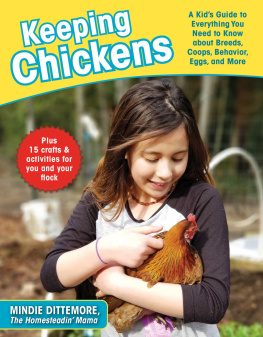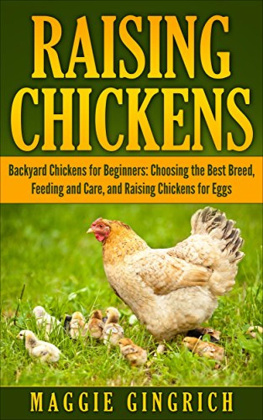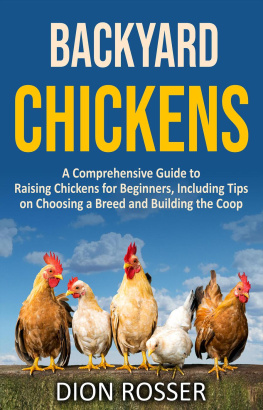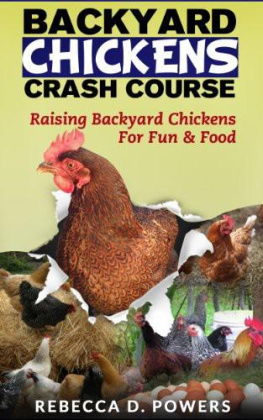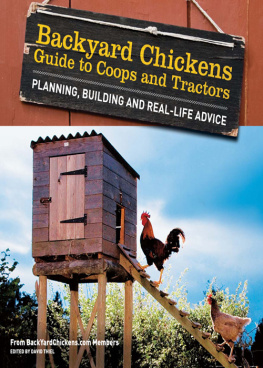FRESH EGGS
Daily
FRESH EGGS
Daily
raising happy, healthy chickens... naturally
LISA STEELE

Fresh Eggs Daily
Raising Happy, Healthy Chickens... Naturally
Copyright 2013 by Lisa Steele
All rights reserved. No part of this book may be reproduced, stored, or transmitted in any form without permission in writing from the publisher, except by a reviewer who may quote brief passages for review purposes.
ISBN-13: 978-0-9855622-5-0
Library of Congress Control Number: 2013941486
CIP information available upon request
First Edition, 2013
St. Lynns Press . POB 18680 . Pittsburgh, PA 15236
412.466.0790 . www.stlynnspress.com
Book design Holly Rosborough
Editor Catherine Dees
Editorial Intern Marguerite Nocchi
Photo Credits: All photos Lisa Steele
The following trademarked products are mentioned in this book: Bach Rescue Remedy for Pets, Blu-Kote, Brinsea EcoGlow, Dawn, Gatorade, Knox Gelatin, Kocci Free, Nutri-Drench, Pedialyte, Sevin, Verm-X, Vetericyn, VetRx for Poultry, Vitamins & Electrolytes
Disclaimer
Any medical or preventive chicken care advice offered herein is purely informational and not meant as a substitute for proper veterinary care. In cases of serious illness, the services of a qualified veterinarian should always be sought.
This book was printed in the United States of America on triple-certified FSC, SFI and PEFC paper using soy-based inks.
This title and all of St. Lynns Press books may be purchased for educational, business, or sales promotional use. For information please write: Special Markets Department . St. Lynns Press . POB 18680 . Pittsburgh, PA 15236
10 9 8 7 6 5
THIS BOOK IS DEDICATED
TO MY GRANDMOTHER,
WHO PASSED DOWN TO ME
HER LOVE OF CHICKENS
AND ALL THINGS COUNTRY.

TABLE OF CONTENTS
How I became a chicken keeper and found a natural way to raise a healthy flock without reaching for chemicals and antibiotics
(including a list of potentially toxic plants)
(alphabetical by common plant names and by benefits)
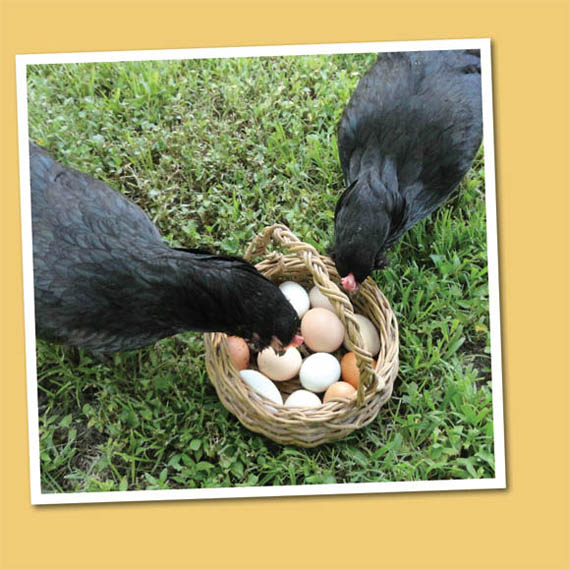
INTRODUCTION

I grew up across the street from my grandparents chicken farm in New England and kept chickens as a child. But the decision to enter into the world of backyard chicken keeping as an adult happened quite by accident. After college, I worked on Wall Street for a number of years, then got married. Shortly after that, my husband retired from the Navy and we moved to Virginia, where we bought a small farm. Because my husband loves horses, he wanted to keep some on our property. I, meanwhile, thought it would be fun to raise goats, since it appeared my days as a career woman were over and I needed something to channel my energy. I kept pestering him about getting a few goats. Finally, in an effort to pacify me, he suggested chickens I guess thinking they would be less trouble.
Now, I have to admit that the idea wasnt all that appealing to me initially. My family always kept a few chickens in a shed out back while I was growing up. I remember wearing oven mitts to collect the eggs so I wouldnt get pecked, always worrying about being attacked by one particularly mean rooster named Bojangles. And the hens werent always very nice, either. In hindsight, the chickens were probably just broody and hadnt been hand raised or paid much attention, but regardless, my experience with chickens to date hadnt been all that positive. However, not being one to turn down the chance to raise any type of animal, I quickly agreed to my husbands compromise, figuring I would still work on him about the goats.
Long story short, we went to the feed store, picked out six chicks, talked a bit with the owner about what we would need for them over the next few days, and brought home our new family members. And that was the start of our journey. I immediately began a crash course, reading as much as I could about raising backyard flocks, barely keeping one step ahead of them.
But I guess chicken keeping is in my blood, because not only was it love at first sight, I had clearly been watching, listening and absorbing a lot more than I realized growing up. I just seemed to know instinctively what to do. I took to the chickens like a duck to water and never looked back. We raise them for the eggs only. I could no sooner eat one of our chickens than eat our cat or dog. Even after the hens stop laying, they will continue to be loved, fed and cared for until they have lived out their natural lives. In fact, older hens make wonderful mothers, teaching baby chicks the ropes.

Todays backyard chicken keepers name their chickens and consider them pets, not livestock.
While Im sure my grandparents enjoyed their chickens and no doubt treated them well, their chickens were purely a food and income source, for the eggs as well as the meat. My grandmother lived to be almost 100 years old, and in the years prior to her death she delighted in sitting talking with me about her (and my) chickens. She couldnt quite understand my naming them all, taking photos of them, or whipping up homemade treats for them; and she just shook her head when I told her I had put up curtains in the nesting boxes, but all I have to say to this new generation of chicken keepers is: These arent your grandmothers chickens! I know she would be amazingly proud of all I have accomplished and how many people I have helped with advice and suggestions on raising backyard chickens.
Though our methods might differ a bit on the finer points of chicken keeping, when I first started raising chickens, I knew I wanted to raise them like my grandparents did, as naturally as possible. Not only would it be healthier for them, it would be healthier for our family, since we would be eating the eggs. A big part of raising our own chickens is being sure we know what goes into them and how best to care for them so using antibiotics, wormers and other chemical-laden commercial medications was never on my agenda.
Live long and prosper
Not a lot has been written about the benefits of herbal and other natural preventives relating to chickens. Few studies have been done and little has been researched. Prior to this new trend in backyard chicken keeping, most laying hens didnt make it much past their third birthday. When their prime laying days were done, they went into the stew pot and a new chick was bought for a few cents, raised, and the cycle continued. If one got sick, it was culled and replaced with a new chick. Life went on.
Today, backyard chicken keepers are treating their chickens as pets with benefits, enjoying the fruitful laying years of their hens but continuing to raise, feed and love them well past their productive years. A chicken can live ten or twelve years or more, barring an unfortunate end at the hands of a predator, so keeping our chickens healthy and happy for the better part of a decade became my goal.
Next page

